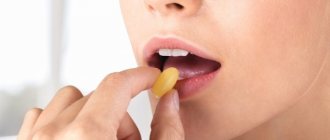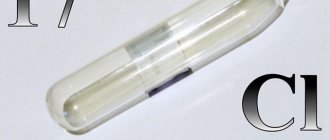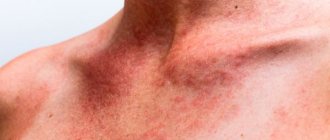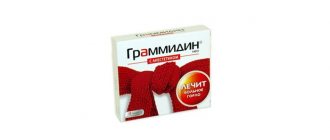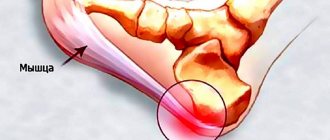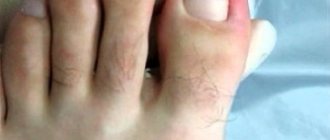The situation when it is discovered that the throat is red and hurts is familiar to almost everyone, since many factors can provoke such a condition. Trying to cope with the disease on your own can lead to serious complications.
Only a doctor, during an examination, makes a competent decision on a set of therapeutic measures, taking into account the nature of the pathogen.
Causes of sore throat
Unpleasant symptoms when swallowing most often occur with the following diseases:
- Viral infection (ARVI), as evidenced by a runny nose, hoarseness, and nonproductive cough;
- Bacterial (most often streptococcal) infection of one of the tonsils, which can be assumed by enlarged lymph nodes in the neck, in the chin area, behind the ear;
- Acute pharyngitis - allergic, toxic or nutritional (due to products entering the body) genesis; Chronic pharyngitis - catarrhal, granulosa or atrophic form;
- In patients 18–30 years old – eruption of additional molars (“wisdom teeth”);
- Radiating pain from cervical osteochondrosis;
- Neurotic pain;
- Irritation of the pharynx or larynx by toxic substances (cigarette smoke, hazardous industrial emissions, etc.);
- Manifestation of sexually transmitted infections (syphilis, gonorrhea), often occurring at normal temperatures in the initial stage;
- Injuries - thermal and chemical burns, ingress of foreign objects (fish bones, glass fragments, etc.), unsuccessful surgical interventions (tracheotomy or tonsillectomy):
- Development of a benign or malignant neoplasm.
Most often, a sore throat that gets worse when swallowing is caused by a viral or bacterial infection. The pathological pathogen enters the mucous membranes of the oropharynx through airborne droplets or household routes, settles there and begins active life. The appearance of tickling, pain, change in voice and coughing indicates the accumulation of toxins produced by pathogenic flora during growth and reproduction.
First aid at home
What should be the treatment before seeking help from a specialist? To reduce discomfort when swallowing, first of all, you need to eliminate factors that contribute to irritation of the mucous membranes. To do this you need:
- stop smoking and drinking alcohol;
- exclude from the diet foods that irritate the throat - spicy foods, citrus fruits, seeds, etc.;
- drink at least 1.5 liters of warm drink in the form of herbal teas and decoctions;
- talk less so as not to overstrain the vocal cords;
- Avoid drafts and hypothermia.
Mechanical injury to the mucous membranes and hypothermia reduces local immunity, which stimulates the proliferation of opportunistic microorganisms in the oropharynx.
Local manifestations of the disease can be quickly eliminated by undergoing complex therapy aimed at eliminating pathogenic viruses and bacteria, as well as increasing the body’s resistance.
TOP 7 drugs for quick treatment of sore throat
Depending on the cause of the sore throat, the patient is prescribed antiviral or antibacterial drugs.
- In case of reflux and autonomic dysfunction syndrome, lozenges are used more for the purpose of distraction therapy.
- For sore throat, for example, it is important to prescribe the right antibiotic or effective antiviral drug, as well as use effective local antiseptics and painkillers.
- For stomatitis, in addition to etiotropic drugs, regular mouth rinses are also used. If you have a local allergic reaction in the throat area, before the ambulance arrives, you can rinse your mouth with a solution of adrenaline diluted in a glass of water.
How to treat a sore throat with local medications, TOP 7 drugs for a sore throat without fever:
- Anti-Angin is a medicine for local use, which is both an anesthetic and an antiseptic. Helps well with pharyngitis, tonsillitis, stomatitis. The maximum daily dose is 6 lozenges (with an interval of 2-3 hours between doses).
- Strepsils Intensive is an effective pain reliever that is used for symptomatic treatment. Available in the form of lozenges with different flavors. Adult patients and children over 12 years of age are recommended to consume no more than 5 pieces per day (after meals).
- Grammidin Neo with anesthetic is an effective lozenge for pain in the oropharynx. In addition, the drug has anti-inflammatory and antimicrobial effects. The drug is contraindicated for a child under 4 years of age. You need to take one tablet 3-4 times a day.
- Inhalipt is available in aerosol form. Contraindicated during pregnancy and children under 3 years of age. One or two injections are prescribed after meals 3-4 times a day.
- Rotokan is a syrup consisting of a concentrate of various medicinal herbs. Contraindicated in case of individual intolerance to its components. Used for rinsing three times a day, always after meals.
- Lollipops Tantum Verde - has analgesic, antimicrobial, antifungal and antiseptic effects. The medicine is prescribed for complete absorption in the oral cavity 3-4 times a day, one lozenge.
- Chlorophyllipt solution is a medicine created on the basis of eucalyptus leaves, due to which it has powerful antibacterial and anti-inflammatory properties. As a result of its use, pain and sore throat goes away.
My throat hurts very much when swallowing, how to treat it? — AnginaNet.ru
Pain in the larynx causes significant discomfort and sometimes suffering. This disease must be treated as soon as possible: it prevents a person from eating and sleeping well, thereby slowing down the healing process.
Why does my throat hurt so much and why does it hurt to swallow?
Pain in the larynx is caused by irritation of the nerve endings of the trigeminal nerve, which are located in large quantities in the throat. The result is a variety of symptoms of sore throat: from mild to severe, throat irritation, itching, dryness, cough and many other unpleasant sensations.
Causes of sore throat when swallowing
- Complications of acute respiratory viral infections caused by the growth of opportunistic microflora: Laryngitis, pharyngitis and tonsillitis;
- inflammatory diseases of the throat caused by specific microflora: tuberculosis, syphilis, mycosis;
- injuries, burns and foreign bodies;
- cervical cancer or metastases from other organs to the throat or adjacent tissues;
- neurological diseases in which pain originating elsewhere is the throat; allergic reactions;
- diseases associated with the growth of the thyroid gland
With temperature
Fever can cause the most common diseases - laryngitis, pharyngitis and tonsillitis. The most common fever is tonsil fever.
No temperature
Without fever, almost all illnesses are accompanied by a sore throat.
Symptoms of diseases
Pharyngitis
This is an inflammation of the back of the throat that appears red. It is usually caused by viruses, which may later be joined by bacteria or fungi. Symptoms -
- perforation in the throat;
- pain when swallowing;
- submandibular lymph nodes multiply, usually symmetrical;
- Sometimes the temperature may rise slightly.
How to properly treat pharyngitis?
Sore throat (Acute tonsillitis)
Tonsillitis. Most often this happens with the following signs:
- temperature rise to 38 degrees;
- constant pain, increased swallowing;
- general weakness and other symptoms of poisoning;
- redness and/or plaque on the tonsils;
- cough with loose mucus or pus.
Forms of angina and tonsillitis
Laryngitis
Inflammation of the mucous membrane of the larynx, which occurs for the same reasons as angina pectoris and pharyngitis, but there are also traumatic and allergic laryngitis. Symptoms:
- hoarseness of the voice, sometimes to the point of inability to speak (What to do if there is no voice?);
- severe pain when swallowing , speaking, coughing;
- cough, dry at first, then may relax;
- the temperature rarely rises.
Is laryngitis contagious?
Other diseases
Injuries and burns are painful with varying degrees of severity when swallowing and occur after the use of a traumatic factor.
There is a sharp pain in the throat with foreign bodies, difficulty swallowing, and coughing. Allergic laryngitis can cause swelling of the larynx and surrounding tissues and, in addition to the inability to swallow, can cause difficulty breathing.
This reaction is especially dangerous in young children and requires emergency medical attention.
Treatment of sore throat without fever
Despite the presence of fever, treatment for inflammation is almost always the same. An exception is a foreign laryngeal body, when it is necessary to first remove it and then treat the inflammation. The second task of the medicine is to relieve pain for the patient. But not all drugs have this property.
Drug treatment
As a rule, drugs of the same brand for severe sore throat contain the same active ingredient.
The difference in release forms is that they are indicated at different ages and contain various excipients that may be contraindicated or require attention when used in certain concomitant conditions, such as diabetes mellitus or lactose intolerance.
What to gargle with?
Treatment of a sore throat is carried out mainly with the following types of medications:
- “Iodinol” – destroys pathogenic viruses and bacteria, helps eliminate catarrhal and purulent processes in the respiratory organs;
- “Chlorhexidine” – disinfects the mucous membrane of the oropharynx and prevents the development of pathogenic microbes and bacteria;
- “Miramistin” – inhibits the reproductive activity of yeast-like fungi, gram-positive and gram-negative bacteria;
- “Rotokan” – accelerates the regeneration of tissues affected by inflammation, has a hemostatic and anti-edematous effect;
- "Furacilin" - accelerates the regression of purulent-inflammatory processes provoked by the development of bacteria and fungi.
Rinsing the oropharynx is one of the most effective ways to eliminate inflammatory processes in the respiratory system. To carry out sanitizing procedures, it is recommended to use medications that have anti-edematous, local anesthetic and anti-inflammatory effects.
Folk remedies
When there is a sharp pain in the throat, medications are not always at hand. Auxiliary therapy is traditional methods of treatment.
The following are popular among them:
- Milk with honey. Before starting treatment, you must make sure that the patient is not allergic to honey. One teaspoon of liquid or solid honey should be added to a medium cup of warmed, but not boiled, milk and drunk slowly.
- Rinse with saline solution. Add 0.5 tsp to 1 glass of warm boiled water. salt, 1 drop of iodine and 2-3 drops of pre-diluted potassium permanganate. The color of the prepared mixture is pale pink. Excessive zeal in the use of iodine and potassium permanganate can lead to the opposite effect - a burn of the mucous membrane.
- Apple-honey composition with onions. One large onion is finely chopped and soaked in a glass of apple cider vinegar for a day. After 24 hours, add a glass of liquid honey to the liquid and stir until smooth. The resulting product is filtered and taken on an empty stomach daily, 2 tablespoons.
- Infusion of chamomile. 1 tbsp. l. dried flowers, pour 200 ml of boiling water, leave for 15 minutes. Strain. Gargling 3-5 times a day soothes a sharp sore throat.
- Milk with onions. The milk is brought to a boil and cooled slightly. At this time, one medium-sized onion is chopped into very small pieces. The onion mixture is poured with still hot milk, wrapped in a towel and left for an hour and a half. For consumption, the liquid is heated and drunk in small sips (a glass in the morning and evening).
- Tea with raspberry jam, honey, chamomile, thyme, St. John's wort, lemon. Drinking plenty of tea, which has antiseptic and sedative properties, has a beneficial effect on the mucous membrane, relieving negative symptoms.
You should not rely only on the effect of folk remedies. Their use for treating the throat and eliminating pain when swallowing is appropriate as an addition to the main course of therapy.
Rinse
The traditional method for rinsing is antiseptic and disinfectant solutions of hydrogen peroxide and furatsilin.
Rinsing is always good for relieving inflammation. Both folk remedies and pharmaceutical preparations can be used.
Pharmaceutical drugs:
- Furacilin solution.
- Iodinol solution.
- Lugol's solution.
- Miramistin solution.
- Chlorophyllipt solution.
- Chlorhexidine solution.
Rinse recipes:
- Table salt, iodine and baking soda.
- Green tea with a teaspoon of salt.
- Lemon or citric acid solution.
- A decoction of a mixture of herbs to which honey is added.
- Hydrogen peroxide, diluted in a certain proportion.
Infusions of various herbs:
For a sore throat, you can use various decoctions and infusions based on the following plants:
- sage;
- eucalyptus;
- yarrow;
- St. John's wort;
- plantain;
- oregano;
- Linden;
- chamomile;
- raspberries;
- honeysuckle;
- calendula;
- currant.
Recipes for gargling:
- A mixture of sage, plantain and chamomile.
- Cranberry juice with honey.
- Sea buckthorn oil.
- Horseradish juice.
- Apple cider vinegar solution.
- Oak bark.
- Water, baking soda and glycerin.
- Ginger-garlic tincture.
- Silicon water.
- Kombucha infusion.
- Cabbage juice.
- A solution of sea salt with iodine.
- Olive oil.
- Propolis.
Which doctor should I contact for treatment?
When it hurts to swallow, but there is no temperature, you need to visit a number of specialists who will help recognize the problem:
- ENT doctor. He will examine the throat and other ENT organs and confirm or rule out the presence of pathology in the pharynx itself. This doctor will recognize pharyngitis, laryngitis or tonsillitis and make sure that there are no tumors in this area.
- Neurologist. He will check the condition of the cervical spine and, if necessary, prescribe an MRI and X-ray of the neck to find out the nature of the problem.
- Endocrinologist. The thyroid gland is being examined. For atypical pain in the throat and neck, he refers you for an ultrasound of the thyroid gland and for donating blood for hormones.
- Gastroenterologist. Checks the patient for GERD, may recommend performing fibrogastroscopy of the stomach, and then selects a treatment regimen.
- Dentist. To exclude problems with teeth, oral cavity, tongue and temporomandibular joints.
- Allergist. If you suspect an allergic nature of the disease.
The patient does not necessarily need to see all the doctors; sometimes at the very first stage, the ENT doctor sees where the problem is and selects a treatment regimen. In the case of an atypical disease, consultation with several specialists and additional research may be necessary to recognize the disease.
Characteristic symptoms
Problems with the throat, including inflammation of the larynx, are indicated by obvious symptoms:
· it becomes painful to swallow not only solid food, but also drinks;
· tickling appears, leading to a lingering cough;
· with serious development of the disease, the voice becomes hoarse or disappears completely;
· temperature rises frequently;
· chills and general weakness appear.
If the pain intensifies, there is no need to self-medicate. You should visit an otolaryngologist to diagnose the disease.
Possible complications
If a sore throat occurs due to infection with viruses or bacteria, you need to start therapy on time. Otherwise, there is a risk of infection of other organs. As a result, the following complications develop:
- Pneumonia is a consequence of an untreated acute respiratory viral infection.
- Sore throat - can cause kidney failure, heart pathologies and joint damage.
- Sinusitis - can appear in the absence of adequate treatment for throat diseases.
- Bronchitis - with a protracted process, there is a risk of chronicity.
- Otitis – when the respiratory system is affected, the ears are often affected.
Diagnostics
In order for the treatment of discomfort and pain when swallowing to be effective, it is important to accurately determine the cause of their occurrence. If you experience a sore throat, you should consult a therapist or otolaryngologist.
Attention! It is best to consult a doctor before starting any treatment, since you can suppress the activity of the pathogen with medications, which will lead to an incorrect diagnosis and complicate the course of the disease.
The patient is required to examine the pharynx - normally it should be pale pink in color, the cervical lymph nodes are not enlarged and painless on palpation. To determine the causative agent of the infectious process, a smear is taken from the pharynx and pharynx and sown on a nutrient medium, thus identifying staphylococci, streptococci, and diphtheria bacillus. Bacterial culture makes it possible not only to accurately determine the causative agent of infection, but also to select an effective treatment.
Prevention
To avoid painful sensations in the larynx, you need to be sensitive to your health and engage in restorative procedures:
- Hardening;
- Food rich in vitamins and microelements;
- Physical activity;
- Staying in the fresh air;
- Rejection of bad habits;
- Full sleep;
- Avoiding stressful situations.
The causes of sore throat are very diverse and can be a symptom of serious diseases. If the pain when swallowing does not go away on the third day and home remedies cannot cope with it, you should contact the clinic. The doctor will help you choose an effective treatment and get rid of throat discomfort in a short time.
Pharyngitis in adults Follicular tonsillitis Retropharyngeal abscess Tonsillitis Purulent tonsillitis Lacunar tonsillitis

